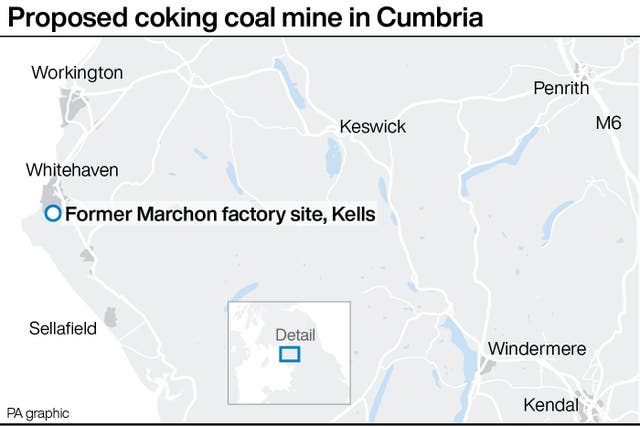Planning permission for UK’s first coal mine in 30 years quashed by High Court
Mr Justice Holgate said arguments in favour of supporting the decision to grant planning permission for the site at Whitehaven were ‘unsustainable’.

The decision to grant planning permission for what would have been the UK’s first coal mine in 30 years has been quashed by a High Court judge.
Mr Justice Holgate said in a ruling on Friday that giving the go-ahead for the development at Whitehaven in Cumbria was “legally flawed”.
Climate campaign group Friends of the Earth (FoE) and South Lakes Action on Climate Change (SLACC) took legal action over the decision by the Department for Housing, Communities and Local Government, then led by Michael Gove, to grant planning permission in 2022.

At a hearing in July, lawyers for FoE said the decision “smacked of hypocrisy” given the UK’s “vocal international advocacy” over the phase-out of coal in energy systems.
Lawyers for WCM said there had been “repeated mischaracterisation” of the plans and the development would have a “broadly neutral effect on the global release of greenhouse gas”.
In his judgment, Mr Justice Holgate said: “The assumption that the proposed mine would not produce a net increase in greenhouse gas emissions, or would be a net zero mine, is legally flawed.”
The court heard the mine was dubbed as being net-zero and would extract what is known as metallurgical coal, which is used in steel-making.
It was also told the Government had previously accepted that approximately 15% of the coal would be used domestically.
After permission was granted in 2022, the Government withdrew its defence of the claim after the general election in July this year following a Supreme Court decision in June which said emissions created by burning fossil fuels should be considered when granting planning permission to new extraction sites.
At a hearing in London, Paul Brown KC, for FoE, said in written submissions that there is “no significant need for the coal” in the UK given statements from British Steel and Tata over their moves to electric arc furnaces.
Estelle Dehon KC, for SLACC, added in written arguments that granting permission for the mine “whether purportedly net zero or not” would lower the country’s status as a “global climate leader”.
In a 48-page ruling, Mr Justice Holgate said the Government “failed to deal” with the fact that “a positive precedent effect of a net zero mine leading to other similar projects would depend upon further offsetting arrangements; that would be undesirable because offsets are a finite resource”.
FoE said the judgment marked the first fossil fuel case to be decided since the Supreme Court ruling earlier this year, and that a decision on planning permission would now go back to the Secretary of State for Housing, Communities and Local Government Angela Rayner for reconsideration.
Niall Toru, senior lawyer at FoE, said: “That the ruling today has gone against the mining company could have ramifications internationally, as there are cases abroad where challenges are being made against fossil fuel projects on a very similar basis.
“This mine should never have been given permission in the first place. The case against it is overwhelming: it would have huge climate impacts, its coal isn’t needed and it harms the UK’s international reputation on climate.
“We believe that the writing is on the wall and that WCM should withdraw its application for this climate-wrecking project.”
Duncan Pollard, a trustee at SLACC, said: “It is now doubly clear that fossil fuel companies cannot ignore the combustion emissions caused by the use of their oil, gas or coal, or rely on simplistic claims that a new coal mine will have zero impact on global emissions.
“We sincerely hope that any re-examination of the coal mine proposal considers all relevant issues and this ill-conceived idea is permanently shelved.
“Central and local government need to concentrate on secure and sustainable jobs for west Cumbria.”
A spokesperson for WCM said: “West Cumbria Mining will consider the implications of the High Court judgment and has no comment to make at this time.”





